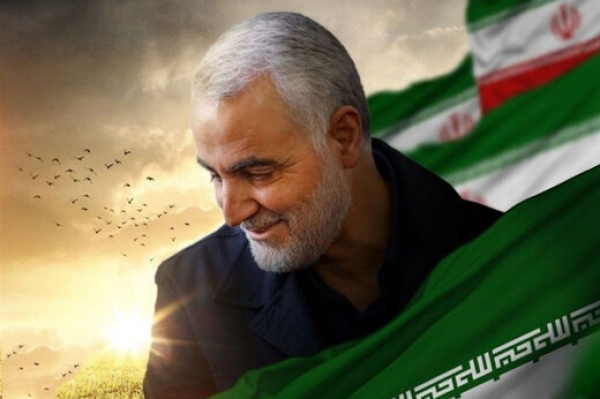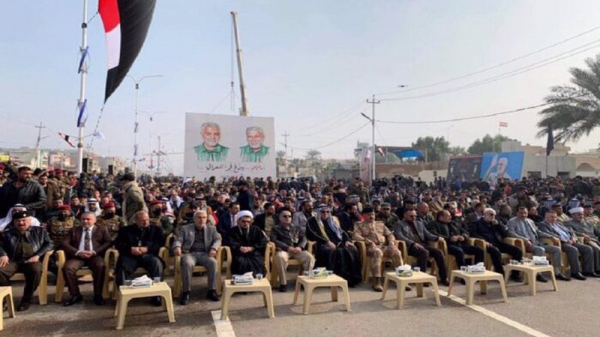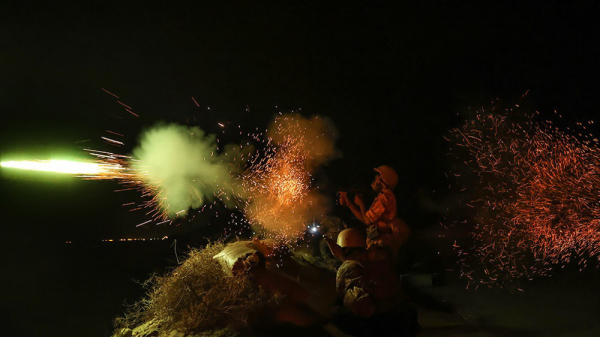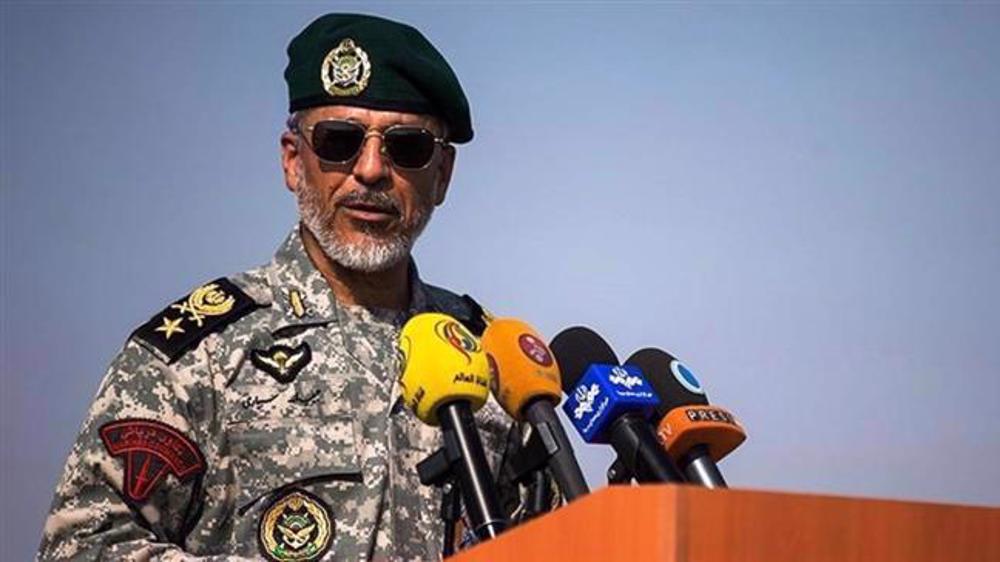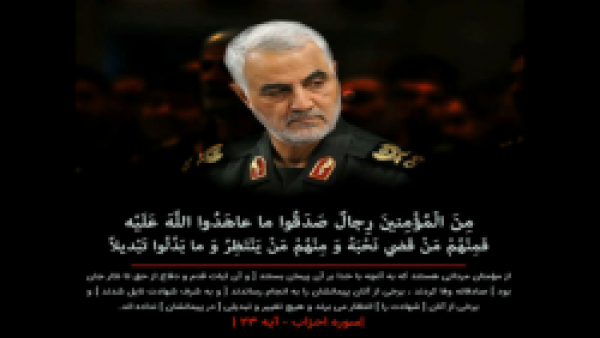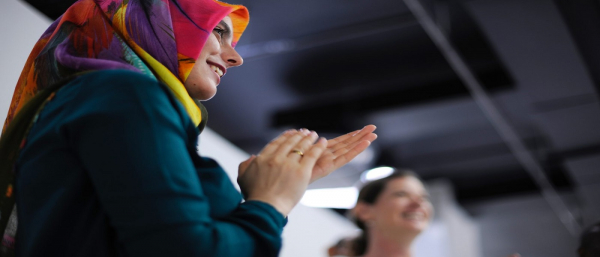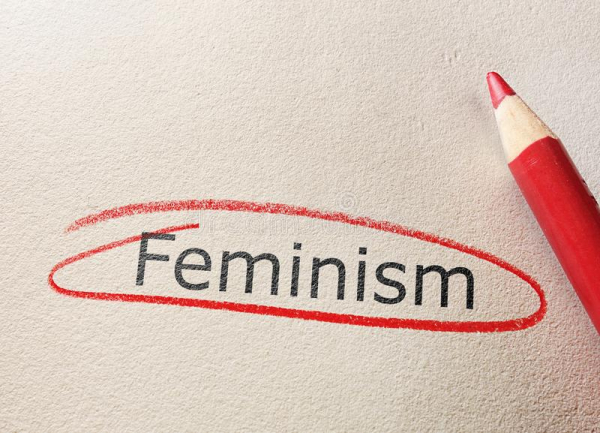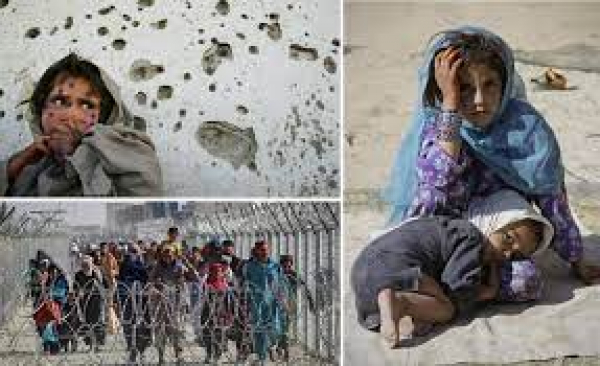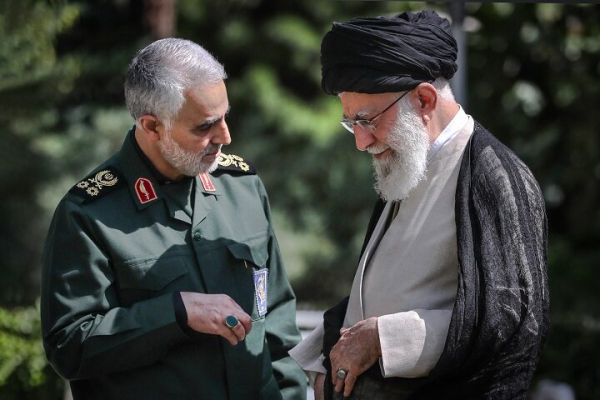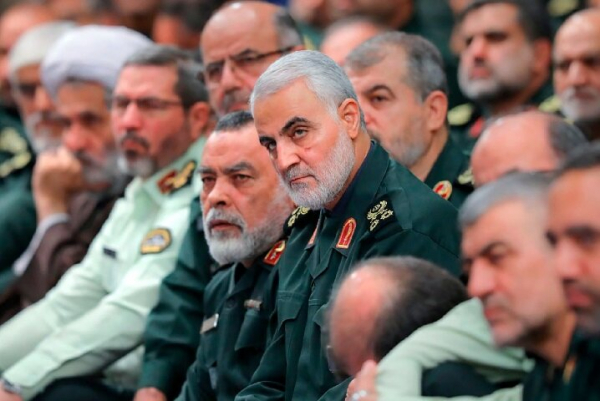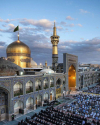hasania
Gen. Qasem Soleimani: A cause for unity among a nation
After the disintegration of the Soviet Union, western countries, under the leadership of the US, placed the re-engineering of West Asia at the top of their agenda in order to ensure the safety of the Zionist regime and protect their ulterior motives.
One aspect of this project was to reshape geographical borders by disintegrating Islamic countries. Accordingly, the multi-faceted project to create terrorist and takfiri groups, such as Al-Qaeda and Daesh, was carried out with the assistance of Saudi Arabia, and the Zionist regime, just to name a few of cohorts.
Iraq commemorates General Soleimani ahead of US assassination anniversary: 'His path will continue’
The Iraqi people have held a ceremony in Salahedine Governorate to commemorate the former commander of the IRGC Quds Force General Qassem Soleimani and his comrades ahead of the third anniversary of their assassination by the United States.
Pople as well as official figures attended the ceremony in the city of Dujail north of the capital Baghdad to honor the memory of the martyrs, including General Soleimani and Abu Mahdi al-Muhandis, deputy head of Iraq’s Hashd Al-Shaabi or Popular Mobilization Forces (PMF).
In the ceremony, the memory of the victory commanders and their key role in defending the Muslim society and confronting the criminal plots of the Daesh Takfiri terrorist group and their masters were honored.
The Iraqi officials also emphasized the importance of continuing the path of the martyrs.
The US military assassinated the two influential commanders and their comrades in a drone strike near the Baghdad International Airport on January 3, 2020, which was directly ordered by former US president Donald Trump.
Both commanders are globally recognized for their role in eliminating the Daesh Takfiri terrorist group in the region, especially in Iraq and Syria. The terrorist group had carried out the most savage attacks and crimes against Muslim and Christian civilians since it emerged in the two Arab countries.
People in Iran and Iraq hold annual events to commemorate the two commanders’ leading role in defeating Daesh and reversing its advances. Prior to its defeat, Daesh had taken control over a large part of Iraq and Syria.
In 2014, when Daesh unleashed its campaign of terror in Iraq, Iranian military advisers led by General Soleimani and upon invitation by the Iraqi government headed to the neighboring country to the aid of Iraqi armed forces, helping them ultimately liberate their entire territories from the US-backed terrorist groups, a battle that took three years to end.
Salahedine Governorate is famous for its city of Amerli, which has a population of 26,000 and was under an 80-day siege by Daesh terrorists from June to the end of August 2014 during the Daesh invasion of Iraq. General Soleimani entered the city in a very dangerous operation by flying over the terrorists in a helicopter to save Amerli from falling.
In November, Leader of the Islamic Revolution Ayatollah Seyed Ali Khamenei said that the name of General Soleimani infuriates the US and its allies.
“Haj Qassem Soleimani was the epitome of the Islamic Republic’s policy in confronting the enemy’s plans. He foiled the enemy’s comprehensive plan,” he said in a speech at a meeting with the country’s Basij Forces.
Iran and Iraq have set up a joint investigation committee to legally pursue the assassination. Based on the latest findings of the legal team, 120 people have been identified in connection with Soleimani’s assassination, with Trump topping the list.
Almost two years after the assassination, at least 78 Iraqis filed a lawsuit in an Iraqi court on November 27 against Trump and other officials of his administration. The plaintiffs demanded legal action against the accused, in the petitions filed at Baghdad’s federal court of appeal.
Iran has vowed to continue its follow-up on the prosecution of all those who took part in the assassination operation of the revered general.
Zulfaqar 1401 drills: Iran Army units exercise coastal defense in Sea of Oman
Various units of Iran’s Navy exercised defending the country’s southern coasts early on Friday to mark the start of Zulfaqar 1400 military drills in the Sea of Oman.
Large-scale joint military drills codenamed Zulfaqar 1400 began early on Friday with the key motto of “self-confidence, power, sustainable security” in an area stretching from the eastern sector of the strategic Strait of Hormuz to the northern tip of the Indian Ocean.
The first hours of the maneuver were dedicated to defending the coasts of the country.
“The Navy’s rangers used improved arms and equipment to carry out the operation and conducted modern tactics and defensive scenarios in the darkness of night,” Brigadier General Alireza Sheikh, spokesman of the drill, said on Friday morning.
“The operation lasted until dawn and the naval forces used Dehlavieh, TOW, and shoulder-fired Misagh missiles against the enemy’s aggression on coastal lines,” he said.
The forces managed to target the mock enemy’s positions using heavy artillery fire, preventing the enemy’s progress, added the spokesman.
Speaking in a press conference on Thursday, Deputy Chief of the Iranian Army for Coordination Rear Admiral Habibollah Sayyari said the drills are aimed at improving planning skills, conducting, directing and evaluating joint operations, and synergizing the defense power of the Army’s four main divisions.
The drills are underway with the participation of infantry and armored units as well as mechanized regiments of the Army’s Ground Force, air defense systems, subsurface, surface and flying vessels, and rangers of the Navy as strategic bombers of the Air Force provide logistical support.
According to Sayyari, the drills also focus on enhancing the skills of the Army’s commanders and personnel in using the combat units and the Khatam al-Anbiya Air Defense Base, drones, electronic and cyber warfare systems.
The massive drills will remind the regional states of the existing capacities and the fact that they do not need any foreign powers to ensure security in the region, he said, adding that the presence of extra-regional countries and warmongers has always brought nothing to the West Asia region but insecurity, war, and occupation.
Iran Army held Zulfaqar 1400 drills in November 2021 in the same area, showcasing its defensive capabilities that are based on domestically-built equipment.
‘Warning to Israel, extra-regional enemies’
Speaking to reporters on the sideline of the drills on Friday, Commander of Iran’s Khatam al-Anbiya Central Headquarters Major General Gholam-Ali Rashid warned enemies of any miscalculation against Iran.
“The Zionist regime is a military and security threat to all regional countries and Iran,” he said.
The commander cautioned regional countries of any cooperation with Israel in threatening Iran’s national security by providing the occupying regime with bases or facilities. He warned that “those bases as well as the starting point of aggression against Iran which is the occupying regime will be the target of our armed forces’ attacks.”
Iranian Armed Forces are “serious” in conducting drills as they consider them a “half war” and even a “war before war,” he noted.
“By carrying out drills, we want the enemies to know that in case of any miscalculation, they will certainly face more costs compared to their achievements,” said the general.
He reminded extra-regional enemies that “our armed forces will fight with a hybrid force which will have a devastating power.”
Expounding on “hybrid force,” the commander said any miscalculation and aggression against Iran’s waters, islands, coasts, and facilities will not just be responded to by Iran’s Navy as “all the defensive and offensive power” of the Army, the IRGC, and regional forces will “crush the enemies in a joint and coordinated mission in a vast geographical area.”
Among the faithful are men who fulfill what they have pledged to Allah: there are some among them who have fulfilled their pledge, and some of them who still wait, and they have not changed in the least.
Can I Convert to Islam And not Wear Hijab?
To answer this question about wearing Hijab, we should first understand why God has sent down religion to man and why He orders man what to do and what to avoid.
Imagine a person who invents an electronic device, for example, a computer; he knows how the computer should be used to give the best outcome. Therefore, there is always a manual coming with the computer that tells us how to use it for a better result. So the user uses the manual to keep the computer safe and productive.
God has created man, and He knows what is good and what is harmful to him/her. He sent the religion and the Quran as a guide for human beings. Following the instructions in the book will lead to the useful, peaceful and productive life of a human.
Why so many hard rules?
Some people say that being a Muslim is not merely to pray or fast or observe the Islamic clothing rules (Hijab), but it is the faith of a person that makes him/her a true Muslim, and obeying the Islamic rules is not as important as having pure faith in God. But the fact is that reaching such levels of faith is only possible by passing the phase of being in complete obedience to God.
Islam means submission and being a Muslim means that one accepts to submit to God’s orders. The father of all Muslims, Christians, and Jews according to the Quran is Prophet Abraham (PBUH): “the faith of your father, Abraham. He named you ‘Muslims’ before” (22: 78). Therefore, from the time of Prophet Abraham (PBUH) the followers of all monotheist religions are called Muslims.
Although some Islamic rules may look hard to obey, the fact is that “Allah desires ease for you, and He does not desire hardship for you” (2: 185), and the rulings of Islam are to make our life easier, not harder. God has provided specific frameworks for us to reach a comfortable, peaceful and prosperous life, and to face fewer challenges in life. One of those rules is observing the Islamic dress code (wearing Hijab).
Our problem is that we can only see limited dimensions of an issue. For example, in case of the Islamic dress code (Hijab), we just see that it may be hard for women to cover up in a specific way. Or they may be unable to present their beauties in the society, while the Islamic dress code (Hijab) is there to make women protected in their social relations. Hijab is for women to be respected and recognized because of their character, beliefs and capabilities, NOT their appearance and physical beauty. It also helps them be less troubled by those men who have sick hearts [i].
Can one be a Muslim and not wear the Hijab?
Before one realizes that Islam is the real truth and as long as people are in search of the truth, there is no blame on them for not being a Muslim and not following the Islamic rules. But, as soon as one understands that Islam is the true religion from God and the most perfect one, then he/she should logically become a Muslim.
After accepting the main principles of Islam (the Islamic axioms), if you have only a few misconceptions about some of the Islamic rulings such as the Islamic dress code (Hijab), it is suggested that you embrace and try to observe all the Islamic rules, especially the Islamic dress code (Hijab).
This is just like taking a prescription from our GP when feel obliged to take all the medicine for a better result without knowing the reason for using some of it. As you start acting according to some of those rules that do not make sense to you, you can begin to study and to understand the reason for some details that may be unknown to you right now.
When we believe in Islam, we should believe in it as a whole. It is not correct to accept some parts of it and reject the other parts because in that case, the peaceful life that is promised to Muslims by obeying all religious rules will not be reachable. This uncompleted obedience is like a machine that has lost some of its components and does not work properly. A Muslim who does not obey all the rulings still counts as a Muslim but does not gain the entire benefits that Islam can bring to a person with complete obedience.
Remember again that Islam means being submissive to God’s orders. We always aim to be the best at something that we start. For example, we may strive to be the best in our education or our career. The same should be with our religion so that one day we may enjoy being as friendly to God as Abraham (PBUH).
“Who has a better religion than him who submits his will to Allah, being virtuous, and follows the creed of Abraham, a Hanif? And Allah took Abraham for a dedicated friend.” (4: 125)
Conclusion
Becoming a Muslim and obeying the Islamic rules has its own adversities, but at the same time, it has many advantages. A real Muslim who does not only stick to apparent rules of Islam and uses the spiritual tips and hints for his/her spiritual growth can reach the most peaceful life; “Look! The friends of Allah will indeed have no fear, nor will they grieve” (10: 62)
Notes:
[i] Hijab
Hijab in Islam
A very significant aspect of Islamic life is “modesty.” According to the Islamic application of the term, modesty is a state of self-restraint which helps us check our manners and appearance, and correct them when necessary.
This general principle is also the main source of Islamic dress code or “Hijab” in Islam which has nowadays caused a lot of questions and contradictions both among Muslims and non-Muslims.
Hijab in Islam, the Real Meaning
When talking about hijab in Islam, maybe the first thing that comes to your mind is women’s wearing a headscarf. But is it all that the word refers to? Does hijab also have something to do with our manner and behavior? Does it concern Muslim men as well as women?
You can read this article to find out what hijab in Islam is really all about.
Can I Convert to Islam and not Wear Hijab?
Well, hijab is an Islamic ruling which is also mentioned in the Quran [i]. And submission to God, of course, means that we should follow His advice even if –or especially when—it is not really easy for us to do so!
Still, if a woman, for example, thinks that she can preserve her modesty without wearing a headscarf and is not quite convinced to conform to the Islamic cover limits –we all have our failures or our personal ideas, don’t we?—it doesn't mean that she cannot be a Muslim, or that she will not receive God’s mercy!
You can read this article to find out if wearing hijab in Islam is actually a matter of choice!
Is Wearing Makeup and Jewelry Allowed in Islam?
Islam has stressed on cleanness and tidiness maybe more than any other religion in the world. But does Islamic dress code or hijab place any restrictions on wearing makeup or jewelry? Are there special occasions where Muslims are prohibited from or, to the contrary, prompted to make themselves up?
This article tries to answer your questions with regards to wearing make-up and jewelry.
Hijab in Islam and other Abrahamic Religions
Some people think that Hijab and its implications are only related to Islam and Muslims. Well, it’s not. It may be the case that the special form of Hijab which is used by Muslims has some differences with other religions.
Have a look at this article, If you want to know more about the history of Hijab and modesty in the Abrahamic religions before Islam.
Why Muslim Women Cover their Hairs?
Really, why would women cover their hair? Why don’t men do this? What is that they are hiding beneath this Hijab? What is the philosophy behind it?
Is it useful for Muslim women or men? Is it only related to appearance and observing some religious etiquette? This article provides answers to this questions based on Islamic sources.
Notes:
[i] Quran 24:30,31
Women, Beautiful Flowers
“Women’s rights” is one of the most important and controversial issues in the world. Today, many people believe that social laws are against the rights of women and should be changed.
Feminism
The western world has experienced lots of social revolutions and movements till now including, Marxism, Communism, Abolitionism, etc. Usually, in these movements, people of a lower social class try to fight against the tyranny and oppression of a higher social class. One of these controversial movements has been Feminism which falls into three eras in the western world.
The first era dates back to the 17th and 18th centuries when the movement was against the Patriarchal culture in the west. As a matter of fact, women supporting Feminism in this era, wanted to be considered respected members of society and that the society understood that sex and gender was not the proper index for making the designation “lower or higher social class”. In other words, the first era can be considered as a philosophical view that indicates the physiology of humans doesn’t put them in a lower or higher position in the society and women should be recognized and respected as humans just like men.
Politicians, scientists and people gradually accepted Feminism in the first era but after a while, the Feminist movement approaches its second phase when feminists intended to be not only respected or considered the same but they also wanted to gain the same position in social activities and have the same jobs just like men.
Feminism in the second era is/was after equalizing the rights of men and women in the community i.e. women can do the same as men even in some complex jobs like Municipal services.
Nowadays, the whole world is facing the third phase of the movement which is called “Modern Feminism”. If we look more precisely into Feminism in the first and second eras we may notice that the main concepts of these two are justice and equality but in the third phase the core concept of modern Feminism is power. Feminists in the first and the second eras were defending (women's rights) against men but in contemporary Feminism they attack! and no one gets to complain; because if you disagree with this phase of Feminism you will be accused of being one of the cruel men who deprive women of their legitimate rights. In the third phase, Modern Feminism wants to create a new world where men are subordinate to women. (1)
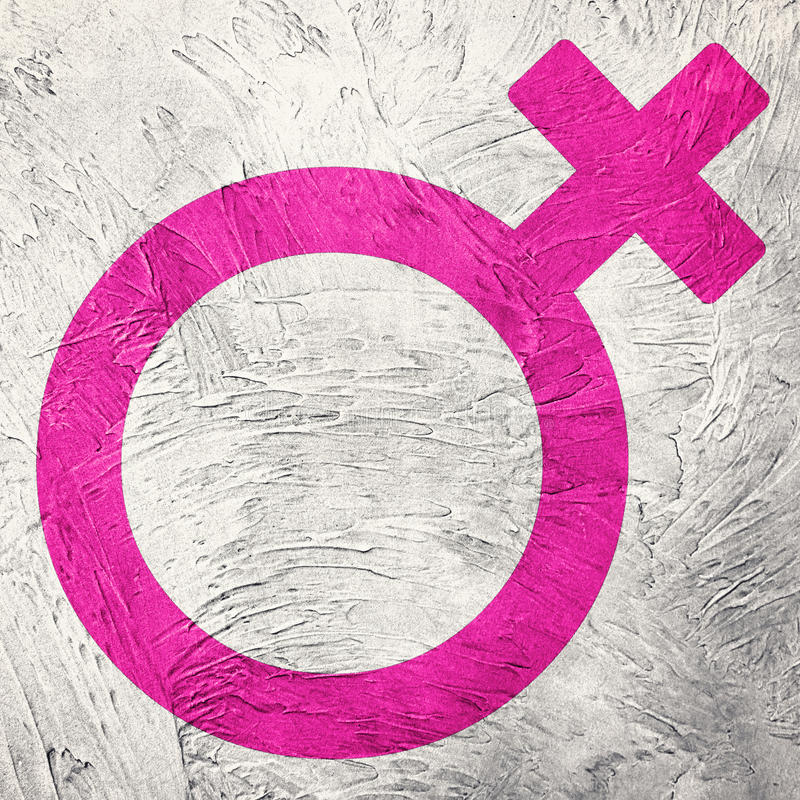
Women and Religion
“Unto the woman He (God) said: 'I will greatly multiply thy pain and thy travail; in pain thou shalt bring forth children, and thy desire shall be to thy husband, and he shall rule over thee”
(Genesis, 3:16)
One of the most important causes that made women start the fight for their rights was religion in the west. In the Bible, Eve (The First woman ever) was the one who tricked man into eating the (Forbidden) Fruit of the tree in midst of the garden. In Judaism and Christianity in which the sin of Adam and Eve is considered an important turning point, women are so blamed and should be ruled over by men because of their sins. The Bible has so many bad (negative) views about women:
“Let the woman learn in silence with all subjection. But I suffer not a woman to teach, nor to usurp authority over the man, but to be in silence. For Adam was first formed, then Eve. and Adam was not deceived, but the woman being deceived was in the transgression.”
(The Bible, 1 Timothy 2:11 to 14.)
“And when they wanted wine, the mother of Jesus said to him, They have no wine. Jesus said to her, Woman! What have I to do with thee?”
(the Bible, John 2:3&4)
Women in Islam
“And of His signs is that He created for you mates from your own selves (husbands and wives) that you may take comfort in them, and He ordained affection and mercy between you. There are indeed signs in that for a people who reflect.” ( The Quran, 30:21)
In ancient Arab culture, women were all considered slaves and servants of men. Having a daughter was considered a great shame for Arabs so they would cruelly kill their daughters by burying them alive. In this regard the Holy Quran says:
“When the girl buried-alive will be asked (on the Judgment Day) for what sin she was killed?” (The Quran 81:8&9)
In this very harsh and dark atmosphere for women, Prophet Muhammad (PBUH&HP) rose and by bringing the Message of Islam, which was Justice and Equality, made clear to everybody that women are the same equality as men. We even can consider Prophet Muhammad (PBUH&HP) as one of the first and true messengers of Feminism.
In Islam, Allah, The Almighty does not differentiate between His pious servants, whether they are men or women.
“O mankind! Indeed, we created you from a male and a female…... Indeed the noblest of you in the sight of Allah is the most God wary among you.” (The Quran 49:13)
“We have enjoined man concerning his parents: His mother carried him through weakness upon weakness (the difficulty of pregnancy) …. Give thanks to Me and to your parents (both father and mother)” (The Quran 31:14)
Therefore, Feminism in the first and second phases are mainly accepted in Islam but there is a point to notice: In the Islamic view, men and women are equal but different. In the sight of Allah, the duties of men and women in society are not the same.
“And the male is not the same as female” (The Quran 3:36)
This is a sentence said by the mother of the Holy Mary (SA) in the Quran. She was after sending her lovely daughter to a place full of men and to a work which mainly men did (serving and working in the temple of Jerusalem). The Quran quotes this sentence to point out that males and females are different and cannot live in a society exactly like each other. For instance, both males and females are obligated to follow a rule named Hijab, but in different ways (The clothes that Muslim women should wear are different from what men should). However, men and women can both participate in social activities as the Holy Mary (SA) did in the temple of Jerusalem. Actually, the rule of the Hijab is for simplifying the communication between men and women in society while women are also safe from bothersome men. So as you see, men and women are the same in the sight of Islam but with different duties.
This is true about the social laws of Islam too. The Holy Quran says:
“Men are the managers of women” (The Quran 4:34)
“They (men) have a degree (in social activities) above them (women) ” (The Quran 2:228)
In the Islamic view, men are responsible for (taking care of) women and should financially support them and because of this, they have a degree in social activities above women but women have no such responsibility while they are also free to have jobs or properties of their own. This is because women are not created to work hard or face the difficulties and the hideousness in society or be responsible for the financial affairs of their families, but they are created to be the emblem of affection and mercy.
Imam Ali (AS) says:
“Female is a beautiful Flower, not a servant or hard worker”2
But the third Phase of Feminism which the whole world is facing now is not accepted by Islam. By equalizing the social duties of men and women and even by giving women many difficult responsibilities in society, Modern Feminism destroys the very souls of women that Allah created in the first place.
The last point to note is that how Muslims treat women in some countries like Saudi Arabia, has nothing to do with the teachings of the Quran and Islam. The way they act is actually the opposite of what the Holy Quran says.
Consequently, Islam accepts women as respected and valued members of the community and men and women are equal and Allah does not differentiate between them because of their gender. But in the Islamic view, Modern Feminism is actually against the rights of women and is not accepted at all.
References
- Women and Family’s Socio ـ Cultural Council Quarterly , vol.9 , Asghar Eftekhari
- Nahj al-Balagha, letter no.31
US State Violence: From supporting terrorism to assassinating a military commander fighting terrorism
It is almost two decades that the United States of America has been seriously claiming to fight terrorism, while there is evidence attesting that America’s actions, the last of which being the assassination of Gen. Qasem Soleimani, have helped develop the terrorist spirit and groups in the region. The following Op-Ed, published by Khamenei.ir, tries to investigate this matter.
Introduction
Despite its claim to be fighting against terrorism, the US is the most important country which carries out the most severe forms of terrorist actions such as supporting sectarian and usurping governments, assisting terrorist groups by proxy and launching direct attacks on civilians. Assassinating Gen. Qasem Soleimani, the Commander of the Quds Force of the Islamic Revolution Guards Corps – one of the most important fronts in fighting against terrorism – showed that the U.S. has even placed overt terrorism at the top of its agenda. In this article, as well as portraying the wide range of terrorist activities by the US, the issue of assassinating Gen. Soleimani as a manifestation of US’s state terrorism will be explained by drawing on international law documents and guidelines.
State terrorism, systematic violence
Terrorism, as one of the current realities of the human community means “The systematic utilization of unpredictable panic or violence against nations or individuals for achieving a political goal.[i]” In fact, systematic – and of course illegitimate, in a legal sense – violence is the most important characteristic of terrorism which is perpetrated with the purpose of instilling fear as a central concept of terrorism. State terrorism is a term that is applied to governments’ interference in the domestic or foreign affairs of another government which is carried out by implementing or participating in a terrorist operation or supporting a military operation with the aim of undermining and overthrowing that government or the entire ruling system of that country. In the twentieth and twenty-first centuries, different forms of state terrorism – such as massacring civilians, imposing hunger, genocide and intimidating large groups of people – have claimed more victims than the actions perpetrated by terrorist groups[ii].
The US and the exhibition of fighting against terrorism
Historical studies show that the employment of dual standards in supporting sectarian and terrorist countries, providing financial and arms support for terrorist groups by proxy and finally, using violence against civilians are examples of the US’s state terrorism.
Despite US claims of fighting against terrorism, Afghanistan has been officially announced as the most dangerous country due to the existence of violence, a large number of victims and terrorism[iii]. Moreover, the US’s attack on Afghanistan and Iraq have proved to be the most important reasons for the expansion of terrorism. Statistics show that after having occupied Afghanistan, suicide attacks have turned into the new model of terrorism: from one attack in 2002 to 310 attacks in 2011, only in Afghanistan and Pakistan[iv]. The occupation of Iraq led to extremist terrorism in that country and then, Somalia, Algeria, Syria, Yemen, Mali and other countries suffered the same fate. In these countries, extremist groups doubled and Salafi fighters tripled in number[v]. Another example of the US’s state terrorism is its attack on civilians, which is known as “drone violence”. According to reports published by the UN, as a result of increasing air attacks on Afghanistan, the number of civilian casualties increased in 2018 in an unprecedented manner: 1,692 civilians dead which shows a 52 % increase compared to 2017[vi]. Generally speaking, in the Iraq war, according to official figures, about 200,000 civilians were killed due to the US’s claimed war against terrorism[vii]. In fact, it is because of this terrorist orientation that the US is considered an international threat. According to a poll conducted by PEW research center on global panorama of US power and influence, about 45% of the people all over the world cite US influence – as well as global threats such as ISIS, climatic changes, economy and cyber attacks – as one of the major threats against the security of their country[viii].
US state terrorism and the martyrdom of Gen. Soleimani:
A. Soleimani was the champion of fighting against terrorism
Undoubtedly, the most important terrorist action perpetrated by the US government against the Islamic Republic of Iran has been the assassination of Gen. Soleimani, the Commander of the Quds Force of the Islamic Revolution Guards Corps, in Iraq. For many years, Gen. Soleimani played a special role in fighting against terrorism in Afghanistan and in establishing the national government in that country. In post-Saddam Iraq too, he played the most important role in holding free elections and asserting the rights of ethnic and religious groups in that country. He was also the leading commander in fighting against the terrorism of ISIS and al-Nusra group in Iraq and Syria[ix]. And he did that while the US had abandoned Iraq so that it would be swallowed by ISIS, despite its security commitments. Soleimani first defeated ISIS in Jof al-Sakhar Operation, carried out in October 2014 and by recapturing Bu Kamal, in November 2017, he put an end to ISIS reign.
While he was on a diplomatic mission – international cooperation between Iran and Iraq for fighting against terrorism – and while he intended to meet with the Iraqi Prime Minister in order to establish peace in the region, he was martyred on January 3, 2020 by American drones. In fact, Gen. Soleimani was targeted, on US President’s order on the soil of a third-party country, as an official and senior representative of the Islamic Republic of Iran and while he enjoyed customary international immunity. However, in defending its action, the US resorted to pre-emptive legitimate defense, which in fact violates the most obvious international law principles and also those of the UN. This is a clear manifestation of state terrorism.
B. Illegitimate terrorism
For many reasons, the US action was an illegal conduct and a clear manifestation of state terrorism. The following pieces of evidence prove this:
The Charter of the United Nations invites governments to resolve their differences through peaceful methods. Within the framework of laws on arms disputes, according to the clause 4 of article 2 in the Charter of the United Nations, the first principle is to avoid resorting to force. Only governmental actions supported by article 51 and the resolutions passed by the UN Security Council in the seventh chapter of the Charter justify exceptions to the rule.
Article 51 of the charter is an exception to the rule of avoiding force according to which, force can only be applied during legitimate defense and in response to an arms attack. “Legitimate defense” is defined as: defending oneself or one’s property against an attack provided that one’s defense is reasonable, necessary and proportionate with the aggressor’s attack[x]. Therefore, for a defense to be legitimate, the element of necessity is very important and Article 31 of the ICC [International Criminal Court] Statute has also confirmed this, stating that the condition is the imminence or the inevitability of an aggressor’s action.
Considering the principles of legitimate defense, which the US has referred to, it is clear that the assassination of Martyr Soleimani cannot be proved by relying on this principle because it does not have any of the conditions specified in the legitimate defense article. Not only was there not any piece of evidence supporting the imminent plan on attacking the US, but also Gen. - entered Iraq to engage in political negotiations, as confirmed by the Prime Minister of Iraq. The human rights reporter of the UN has also stressed that the US did not provide sufficient evidence showing that its regional interests were in danger so much so that it could justify its attack on Soleimani team. Therefore, in the absence of a real and imminent threat against the lives of individuals, the course of action adopted by the US was illegal[xi].
Since the Commander of the Quds Force entered the Iraqi soil at the invitation of the Iraqi government, in a legal manner and absent war conditions, his presence cannot be considered as a presence in a war zone. Moreover, according to human rights principles, even if we assume that there was a war condition, a drone strike against human targets violates the right to live and the principle of human dignity and therefore, it is a clear manifestation of trampling on fundamental human rights. From another viewpoint, according to Article 8 of ICC Statute, every clear violation of international conventions, of international laws, and of arms dispute regulations is considered a war crime.
In light of the US government’s terrorist activity, according to articles 1 and 2 specified in the Responsibility of States for Internationally Wrongful Acts (2001), passed by the human rights commission of the UN, the US government is responsible for its international crime. Therefore, the Islamic Republic’s retaliation is justified according to article 22 of the Responsibility of States for International Wrongful Acts. On the basis of this article, arresting, condemning and punishing the perpetrators and those who issued the order are among acceptable measures according to international law conventions, and therefore, these measures should be pursued.
Of course, the US’s action in assassinating Gen. Soleimani was not surprising for the people of Iran and for the world of Islam considering that country’s notorious history of state terrorism, but undoubtedly, if the US continues to engage in terrorist activities, it could have important consequences for international laws, international organizations and fundamental values such as human rights and avoidance of violence and force. In fact, the US’s disregard for the Charter of the United Nations will be the most important challenge that the global community will face especially as Agnes Callamard, the human rights reporter of the UN described the attack on Soleimani and his entourage in Iraq as an act that violates the charter of the United Nations[xii].
Conclusion
On the issue of the assassination of Gen. Soleimani, the international community was once more witness to a contradictory conduct on the part of American politicians. The division of terrorism into good and bad is the clearest manifestation of this conduct: Whenever its interests dictate it, not only does the US support terrorism, but it also engages in terrorist activities. As stated above, that assassination was completely against international law principles and a clear example of state terrorism. With the beginning of an era described as the decline of the US, such actions will increase the US terrorist threats and the violation of countries’ national authority. As cyber espionage, economic sanctions, trade on security and breaching commitments have turned into the most important characteristics of US behavior, state terrorism too will be more utilized in the future by that country. Therefore, it is necessary for the international community to stand up against the US’s illegal and destructive actions by relying on multilateralism.
[i] Britannica, The New Encyclopedia Britannica, Vol.11, Micropaedia, 1986, p560.
[ii] James Sluka, "Introduction: State Terror and Anthropology", in JefieySluka(ed.), Death Squad: The Anthropology of State Terror, Philadelphia: University of Pennsylvania Press, 2000, pp 1-45.
[iii] Global Peace Index 2019, The Institute for Economics & Peace (IEP)
[iv] Chicago Project, "Suicide Attack Database", Chicago Project on Security and Terrorism, CPOST data posted as of October 12, 2016, Available at http://cpostdata.uchicago.edu/search_results_new.php
[v] Chicago Project, "Suicide Attack Database", Chicago Project on Security and Terrorism, CPOST data posted as of October 12, 2016, Available at http://cpostdata.uchicago.edu/search_results_new.php
[vi] DW, Civilian deaths hit record high in Afghanistan: UN, Available at https://www.dw.com/en/civilian-deaths-hit-record-high-in-afghanistan-un/a-44680606
[vii] Statista, Number of documented civilian deaths in the Iraq war from 2003 to November 2020, Available at https://www.statista.com/statistics/269729/documented-civilian-deaths-in-iraq-war-since-2003/
[viii] Manevich, Dorothy and Hanyu Chwe, Globally, more people see U.S. power and influence as a major threat, Pew Research Center, 2017.
[ix] Sunday Times, Iranian general leads defence of Baghdad, Available at https://www.thetimes.co.uk/article/iranian-general-leads-defence-of-baghdad-fgn5xzd5gct
[x] Bantekas. Ilias, Nash.Susan, International Criminal Law, London: Cavendish Publishing limited, 2003, P 138
[xi] Callamard, Agnes, All drone strikes ‘in self-defense’ should go before Security Council, UN Human Rights Council, Available at https://news.un.org/en/story/2020/07/1068041, 9 July 2020.
[xii] Callamard, Agnes, All drone strikes ‘in self-defense’ should go before Security Council, UN Human Rights Council, Available at https://news.un.org/en/story/2020/07/1068041, 9 July 2020
12 of General Soleimani’s outstanding features in Imam Khamenei's words
The Supreme Leader of the Islamic Revolution spoke about some of the characteristics and actions of the hero of the Islamic nation, Martyr General Soleimani, in his statements on December 16, 2020, and January 8, 2020. On the occasion of the anniversary of Gen. Soleimani’s martyrdom, Khamenei.ir is reviewing 12 of these features:
Well, these days, many things have been said about that great personality, that good, dear, courageous and fortunate comrade of ours who went to heaven. And what they said about him and his personality traits are correct, but I too wish to raise certain points which I think are important:
1. He was brave and a strategist, and a man of action at the same time
Shahid Soleimani was both brave and insightful. His actions were not merely marked by courage. Some people have courage, but they do not have the necessary wisdom and acumen to utilize their courage. And some people enjoy wisdom, but they do not take action. They do not have the guts to take action. Our dear martyr both had the necessary guts and the necessary acumen. He would embrace danger and he had no fears. His courage showed itself not only in recent events but also during the Sacred Defense Era during which time, he was the commander of the Tharallah Army. Both he and his army showed exemplary courage. And he was a man of wisdom as well. He would think carefully and he had reasons for his actions. This simultaneous courage and acumen manifested itself not only in the arena of the military, but also in the arena of politics. I said this many times to the friends active in the arena of politics as we were witness to his behavior and his actions. He was courageous and wise in the arena of politics as well. His words would exert tremendous influence and they were convincing.
2. He used his courage and acumen on the path of God
Above all, he was pure and sincere. He would expend his courage and acumen on the path of God and he was not a hypocrite and a pretentious man. Sincerity is very important. We should practice sincerity as well.
3. He strictly observed the limits set by God
Another one of his qualities was that despite being a commander who had mastery over the military, he was very careful to observe shar’i principles. Sometimes, people forget about shar’i principles in the arena of war, saying that there is no time for that, but he was very careful in this regard. He would not use weapons if he did not deem it necessary. He would take care not to transgress against other people’s rights. He would exercise caution in areas that many people do not deem necessary, but he would try to be cautious. He would embrace danger, but at the same time, he would protect others’ lives as far as he could. He would watch over the lives of his comrades, his soldiers and his colleagues from among other nations who stood beside him.
4. The Revolution and being a revolutionary were his red line
The Revolution and being revolutionary were his definite red lines. Some people should not try to undermine this aspect of his personality. This is a reality about him. He was absorbed by the Revolution and being a revolutionary was his red line. Of course, he was not interested in aligning himself with different parties, different factions and the like, but he was completely committed to the idea of being a revolutionary. He was committed to the Revolution and to the auspicious and dazzling guidelines of our late Imam (may God bestow paradise on him).
5. He neutralized all of the illegitimate plans of the US for the West Asian region
One example of his insight and his courage was that – the enemies might know this well, but some friends might not know it – is that he managed to foil all illegitimate plots of the Americans in West Asia with the help of regional peoples – or it could be said with the support that he offered to them. That man managed to stand up to all the plots that had been hatched with money, with vast propaganda efforts made by the Americans, with the diplomatic capabilities of the Americans and with the bullying that they exert on politicians – particularly on some weak countries. He managed to foil all the schemes set up by them in West Asia.
Regarding Palestine, the Americans intended to consign the issue of Palestine to oblivion and to keep the Palestinians weak so that they would not dare speak of fighting, but that man empowered the Palestinians. He did something to make a small region like the Gaza strip – which is a small strip of land – stand up to the Zionist regime despite all their extravagant claims. He created such a disastrous situation for them that they asked for ceasefire after just 48 hours! This was done by Hajj Qasem Soleimani. He empowered the Palestinians. He helped them stand up and resist.
This is what our Palestinian brothers have said to me time and time again. Of course, I was already aware of his feats, but they testified to that. All Palestinian leaders acknowledged the same thing on their numerous trips to our country. That is while when we had meetings with such officials, who were in contact with him – these were ordinary official meetings – he would sit in a corner in order not to be seen by others. If we needed to know his opinion and if we needed his testimony, we had to look here and there to find him. He would not place himself within sight and he was not a man of pretentio.
The US plans in Iraq, Syria and Lebanon were foiled thanks to the assistance and actions of that dear martyr. The Americans would like Iraq to be like the taghuti regime of Iran – the Pahlavi regime which existed in the past – or like today’s Saudi Arabia. They want it to be a region full of oil where they will be able to do whatever pleases them. As that person said, they want that country to be a “dairy cow”. They want Iraq to be like that. However, pious and brave personalities, youth and marja taqlids of Iraq stood up to the Americans and Hajj Qasem- may God bestow paradise on him- helped and supported that vast front in its entirety. He proved to be an active counsellor and supporter in that country.
The same thing can be seen in the case of Syria and Lebanon. As for Lebanon, the Americans are willing to deprive Lebanon of its most important element of independence – in other words, the Resistance Force and Hezbollah – so much so that Lebanon would be defenseless in the face of Israel and so that they would be able to advance as far as Beirut. As it happens, they did so years ago. However, Hezbollah became stronger on a daily basis. Today, Hezbollah serves as both the hands and the eyes of Lebanon. And our dear martyr played a brilliant and prominent role in this regard. He enjoyed acumen and courage. He was a brave mujahid and a diligent brother.
6. His martyrdom showed the whole world that the Revolution is alive
Another chapter about Shahid Soleimani is the blessings ensuing his great martyrdom. Whenever that dear martyr delivered a report – be that a verbal or a written report about the tasks that he had carried out – I would praise him both verbally and deep in my heart, but [today] I bow down in respect to what he started and brought about for the country and for the whole region [Audience weeps]. A great feat was accomplished. He caused a movement. His spirituality and his martyrdom made him so prominent and outstanding. See how the Iranians and the Iraqis bid farewell to him. Notice how the people in Kadhamayn, in Baghdad, in Najaf and in Karbala behaved in bidding farewell to that body torn to pieces. [Audience weeps]. I thank his pure soul from the bottom of my heart.
His martyrdom showed the whole world that the Revolution is alive in our country. Some people wanted to pretend that the Revolution is over and that it is dead – of course, some people are still trying to make this happen. However, his martyrdom showed that the Revolution is alive. You saw what happened in Tehran and in other cities. With his martyrdom, Shahid Soleimani cleansed dust-covered eyes. The enemies felt humble in the face of the greatness of the Iranian nation. Of course, they may not show it, but they have no other option. The enemies who are trying to describe that grand mujahid and that Sardar and Commander of fighting against terrorism as a terrorist – in other words, the unfair and untruthful Americans who rave and rant all the time and whose words are actually worthless – had such intentions in mind, but the Iranian nation slapped them across the face! [ Jan 8, 2020 ]
7. He became the champion of the Iranian nation and the Islamic nation
The Soleimani martyrdom is a historic event. It is not a normal event that will be erased from historic memory. That event was recorded in history as a brilliant incident. Shahid Soleimani turned into the champion of the Iranian nation and the Islamic Ummah. This is a fundamental point. Iranians are proud of themselves for the fact that a man rose from a distant village who turned into a brilliant personality and a champion of the Islamic Ummah as a result of his endeavors and self-edification.
8. He was the embodiment of Iran and Iranian cultural values
He is the champion of the Iranian nation because the people saw in him their own cultural, spiritual and revolutionary assets and values. While he was still alive and while he was pursuing his work – in a very simple manner and without any ostentation – the people would put up his photos on the street and they would feel proud of him. And when he was martyred, it was not only revolutionaries who commemorated him. Rather, people from all social backgrounds showed their sentiments towards him: even those who were not expected to show their feelings for a revolutionary figure. Why is that? It is because of this fact: he was the embodiment of Iran’s and the Iranians’ cultural values. This is really valuable. From another perspective, he enjoyed a spirit of courage and resistance. Courage and resistance are among Iranian qualities. Humiliation, retreat, passiveness and other such negative qualities are the antithesis of our national sentiments. Those who claim to be nationalists, but who act in a weak and humiliated manner are self-contradictory. He was the embodiment of courage and resistance. Everyone could see and witness this in him.
9. He was very bright
We could equally refer to his acumen and intelligence. He was very smart. There are many points about this aspect of his. Long before its realization, he predicted the emergence of a so-called religious orientation that was inclined to a particular denomination and that worked against the Resistance and he shared his thoughts with me saying: “According to what I see in the world of Islam – he mentioned the names of some countries – a certain orientation is coming into being.” And after a while, DAESH came into being! He was a shrewd and intelligent person. When dealing with the affairs in the countries where he was involved, he would act in a very wise and judicious manner. I could easily feel this. Well, we were constantly in contact with one another about different matters. He was shrewd. This is another Iranian quality. This is another quality of our Iranian cultural assets.
10. He exhibited a spirit of self-sacrifice and love for human beings
He also exhibited a spirit of self-sacrifice and love for human beings. He did not attach significance to this or that nation. He loved all human beings and he sacrificed himself for everyone. Moreover, he was a man of spirituality, purity and piety. He was really spiritual, pure and mystical and he did not pretend. Well, these are a collection of valuable virtues and ethics. The people saw these in him and he embodied them. In the deserts and mountains of such and such countries, he faced different enemies and he embodied and reflected the values of Iranian culture. Therefore, he turned into the champion of the Iranian nation.
11. He was a manifestation of Resistance against Arrogance’s coercion in the Islamic world
On the other hand, we said that he was a champion of the Islamic Ummah. Why? Because with his moves and ultimately, with his martyrdom – his martyrdom also complemented his actions – he became the code word for inspiration and for rallying the Resistance front in the world of Islam. In today’s world of Islam, whenever some people wish to resist in the face of arrogant bullying, their role model and their code word is Shahid Soleimani. He is respected and commemorated in different countries. His photo is put up here and there, his name is chanted on every tongue and they hold different occasions in his memory. In fact, he taught the people how to use the resistance software and the fighting paradigm and he promoted them among nations. Well, these are very important and very sensitive roles. That is why he is an outstanding personality and a champion icon in the world of Islam.
12. He defeated Arrogance both during his lifetime and with his martyrdom
These are facts that have been proven. He defeated arrogance in his lifetime. The reason being that the American president [Donald Trump] once said: “We spent seven trillion dollars in Iraq, but we gained nothing.” He even had to travel in the dark of night to pay a visit to an American base in Iraq. The whole world believes that the US did not achieve its goals in Iraq and Syria – in particular, in Iraq. Why? Who was the agent behind their failure? It was Soleimani who was the champion. Therefore, he defeated them in his lifetime.
He defeated them after his martyrdom as well. The burial ceremony that was organized in Iran for him was really astonishing and unforgettable. The same is true of the burial ceremony in Iraq with the presence of millions of Iraqis. They bid farewell to his body in Najaf and Baghdad: with the participation of millions of people! He as well as Shahid Abu Mahdi al-Muhandis were bid farewell. That ceremony and the following commemoration events astonished the soft war generals in the camp of arrogance. The outstanding and most influential generals in the soft war of arrogance were astonished to see that incident and they could not understand, in any way, the great movement that defeated them. [ Dec 16, 2020 ]
The US as an impediment to the stability of nations: a case study of the assassination of Gen. Soleimani
The United States, since its formation as a superpower after the end of World War II, has continuously sought to establish itself as the world's number one power. Therefore, the US government has sought to advance its interests in various parts of the world and sought economic and political domination over countries that were of geopolitical importance, enjoyed substantial underground resources, etc.[1]
After World War II and the spread of an increase in seeking independence and feelings of anti-colonialism in different parts of the world, US presidents could not resort to the aggressive, military methods used by the colonizing countries of the past such as Britain, France, and others to expand their dominance over the world. Therefore, under the pretext of confronting dictatorial regimes in target countries, establishing democracy, spreading freedom and equality, and suppressing reactionary, anti-liberation forces, they carried out maneuvers such as coup d’états, military strikes, economic sanctions, assassinations and the establishment of puppet governments.[2]
In some cases, the use of these methods led to the modern colonization of wealthy countries with rich human and underground resources, and in some cases they failed. Several countries managed to maintain their political and economic independence in the face of US expansionism. Of course, the United States has increased its pressure on these countries.[3][4][5]
Countries targeted by the United States after World War II include the following: Greece, Syria, Cuba, Albania, Guatemala, Laos, Lebanon, Iraq, Turkey, Ecuador, Vietnam, the Dominican Republic, Congo, Brazil, Bolivia, Indonesia, Zaire, Panama, Ghana, Cambodia, Chile, Uruguay, Argentina, South Korea, Chad, Granada, Philippines, Nicaragua, El Salvador, Haiti, Uganda, Colombia, Pakistan, Venezuela, Georgia, Uzbekistan, Kyrgyzstan, Honduras, Yemen and Egypt.[6]
Examining the causes and consequences of some of these US interventions is enlightening. In the case of Yemen, the United States is trying to control one of the world's most sensitive sea transit routes, the Bab al-Mandeb Strait, and prevent the formation of a united political system in the Islamic Republic of Iran by supporting the Saudi crimes with its military, intelligence and media. But due to the resistance of the Yemenis, they have not yet succeeded in their goals. In contrast to the promised freedom and democracy that was to be formed in Yemen, a humanitarian crisis, famine, and the displacement of millions of people have been imposed on them. Of course, the United States has been able to gain a great deal of money by selling a mass of weapons to Saudi Arabia.[7]
In Venezuela, much effort has been put into creating a coup and overthrowing the country's pro-independence governments that have been blocking US access to its underground resources and agriculture. The intensity of US interventions in Venezuela reached to a point where instead of Nicolas Maduro, Juan Guido was recognized as the President of Venezuela. Threats of military intervention, financial aid to Guido and his supporters, and severe economic sanctions have put much pressure on this South American country. But the Venezuelan people have realized the dangerous consequences that would result from the country's independent government being overthrown. It would mean all of the country's resources being plundered. Therefore, they have stood up to all the pressures brought by the US. And the Islamic Republic of Iran has provided technical assistance and exported some commodities to Venezuela. In this way, Iran has brought the feeling of awe that people had regarding America under question and proved its true friendship with Venezuela.[8]
In Libya's case, the United States, France and England’s military intervention under the pretext of overthrowing a dictatorial government and establishing a popular, freedom-loving government eventually lead to the looting of the country's oil resources, a civil war in Libya, the elimination of people’s security, and the widespread involvement of other countries in Libya’s internal affairs. The United States, its allies in Europe together with reactionary Arab countries have tried to repeat this pattern in Syria, Iraq, Lebanon, Egypt, etc. Fortunately, due to the internal resistance of the people and the help of the Islamic Republic of Iran, such conspiracies have failed except in the case of Egypt.[9]
The key role of the Islamic Republic of Iran in countering the United States' undermining the independence and national sovereignty of other countries through coups, military attacks, the promotion of terrorism, and the creation of deviant Jihadist groups backed by the West and reactionary Arab states has led to the United States allocating much energy and money to confront the Islamic Republic of Iran in the past three decades. One of the key figures who was able to thwart the US’s unlawful interference that was designed to destroy these countries' independence and freedom, especially after the US military invasion of Iraq and the planned civil war in Syria and Lebanon, was General Qasem Soleimani.[10]
To defend the interests and independence of Muslims in other Islamic countries and strengthen their resilience against the aggressions of the United States, Israel, and their other allies, General Soleimani sought to activate those countries' potentials. Hence, the Popular Mobilization Forces in Iraq and the National Defence Forces in Syria were formed. With the help of the two countries' armies, these two forces were able to suppress the ISIS terrorists.[11]
On the other hand, General Soleimani, in addition to his military prowess and strategic thinking, which was a result of the experience he had gained in fighting the Ba'athist government during the Imposed War and years of military activity, had many of the qualities of an experienced diplomat. Thus, he was able to persuade and unite other countries and political forces. For example, during a short visit to Russia, he persuaded President Putin to maintain a military presence in Syria.[12][13]
Another point worth noting is that Martyr Qasem Soleimani believed attempts to preserve Islamic countries' independence and interests needed to include all Muslims (both Shia and Sunni). He considered ISIS and other similar terrorist groups to be a threat to the entire Islamic world's security, independence, and freedom. And he indeed practiced what he believed and helped many of the countries in the region threatened by the deadly shadow of ISIS, including Sunni groups in Syria and Palestine. By the same token, with the escalation of ISIS's crimes in Kurdish areas and in a situation where the United States and Arab countries were unwilling to help the Kurds, Qasem Soleimani prevented the fall of the city of Erbil and it falling under the control of ISIS by rapidly bringing in a military presence.[14]
On the other hand, with the help of ISIS and using its military and financial capabilities, the United States tried to divide Iraq and Syria and plunder these countries' material and cultural resources while dealing a major blow to Iran at the same time. If the Syrian and Iraqi governments had collapsed, Iran would have lost contact with Lebanon and the Resistance groups in that country. In this way, Israel's security as US’s main ally in West Asia would have been better guaranteed. But with the destruction of ISIS, the strength of the Resistance Forces and the solidarity between Iran, Iraq, Syria, Lebanon and Palestine increased more than ever.[15]
As a result of these victories, the regional Mujahid and fighters against ISIS, with their varying cultures and customs from Iran, Syria, Lebanon, Iraq, Afghanistan, Pakistan, etc., fought side by side with the common enemy, which was supported by the United States, Israel, Saudi Arabia and the UAE. Thereby, the culture and spirit of Resistance against foreign colonization was substantially exported to other Islamic countries as a practical model.
General Soleimani’s role in the above mentioned unifying achievements was vital and this prompted the United States to remove him physically. The assassination of the top military Commander of the official army of an independent country that was not at war with the United States and was on a military mission in another independent country was a violation of all international treaties, many of which the United States had participated in writing and ratifying. However, there have been many cases throughout history where American officials have shown their readiness to violate international treaties and agreements that stand at odds with their expansionist interests in other countries. If they find a person or persons to be troublesome in this regard, they violate all legal, political, and moral agreements and frameworks. If they do not achieve their goal through sanctions, demonization, creating controversies and lying by way of the mass media, they eventually assassinate him/her.[16][17]
This process was also used in the case of Martyr General Soleimani. His numerous achievements led the United States to finally remove him physically. After this outrageous act, US President Donald Trump brought contradictory arguments to justify his action.[18]
On the one hand, he stated that the assassination of General Soleimani was a precautionary measure aimed at preventing war. According to many American analysts, the assassination of a senior Iranian military Commander by the US government during a time of peace between the two countries was a declaration of war on Iran. So Trump was supposedly using an aggressive, belligerent move as a way to prevent war. Furthermore, Trump claimed that he had saved the lives of Americans by ordering this assassination. But Iran's military response in attacking the Ain al-Assad Airbase, its continuing to confront that country's military presence in Iraq, Syria, Afghanistan, etc., and their high number of casualties led to their withdrawal. Thousands of US troops were evacuated from these countries, which didn’t do anything to help save the lives of US troops.[19][20]
But Trump's most absurd reason for assassinating General Soleimani is that the US president has described him as being the world's greatest terrorist.[21] General Soleimani, by leading Iran's efforts and helping countries in the region to a great extent, helped to eradicate ISIS in Iraq and Syria and prevented the spread of US-backed terrorism. And yet, the US government, which had brought war, poverty, insecurity, corruption and terrorism to the Muslims of these countries by way of their military intervention in Afghanistan, Iraq, Pakistan, Syria, etc., accused Iran and General Soleimani of supporting terrorism.[22]
Trump thought the assassination of General Soleimani would have the same effect that the assassinations of some outdated White House mercenaries such as Bin Laden and Abu Bakr al-Baghdadi had. He thought that in the same way that those assassinations severely reduced the operational capacity of al-Qaeda and ISIS, the assassination of General Soleimani would do the same. Iran's ability to help neighboring countries diminishes the US hegemony. Trump also hoped to inflict a major, irreparable blow to Iran and make up for US failures to plunder and infiltrate West Asia.[23] Trump also sought to exploit the results of this terrorist act for his election campaign. The pressures of economic sanctions on Iran, the US’s withdrawal from JCPOA, and the conspiracies of Israel and Saudi Arabia had not had the desired results. American policies in Lebanon, Iraq, Syria, Yemen, and Bahrain, and even efforts to improve Qatar’s relations with Saudi Arabia and the United Arab Emirates had failed. According to his calculations, Trump thought he could change the situation in favor of the US with a military strike. [24]
But the result of this action was an increase in national unity and public solidarity in Iran in defense of the country's policy to support countries in the region against the United States. It also intensified anti-American sentiment in all the countries in the region and increased military attacks on its military forces.[25] The White House was also forced to reduce its military presence in many countries where it had planned to plunder their resources and destroy their independence.[26] Iran also attacked a US military base for the first time since World War II in response to the United States action, and they rained rocket fire on the Ain al-Assad Airbase in Iraq, calling into question its credibility and hegemony.[27] Thus we can see that although Iran and the Islamic world were deprived of General Soleimani’s abilities with his assassination, the consequences of this action were completely to the detriment of the United States, Israel and Saudi Arabia, and it pushed them several levels back. On the other hand, Iran has continued to play a role in the West Asian region, to help countries eliminate dependence and to stand up to the illegitimate, aggressive greed of the US.
[1] https://courses.lumenlearning.com/boundless-ushistory/chapter/american-imperialism/
[2] https://journals.openedition.org/etudesafricaines/214?file=1
[3] https://tass.com/world/1107983
[4] https://www.wsws.org/en/articles/2003/04/iraq-a15.html
[5] https://www.scfr.ir/en/politics/116268/us-strategy-looting-syrian-oil/
[6] https://fas.org/sgp/crs/natsec/R42738.pdf
[7] https://fas.org/sgp/crs/natsec/R42738.pdf
[8] https://venezuelanalysis.com/analysis/14267
[9] https://www.middleeasteye.net/opinion/libya-another-year-bloody-crisis-caused-western-meddling
[10] https://iranpress.com/content/18040
[11] https://en.irna.ir/news/83668892/Iraqi-ex-PM-Iran-Iraq-defeat-ISIS-together
[12] https://www.reuters.com/article/uk-mideast-crisis-iran-russia-idUKKBN0TZ1NY20151216
[13] https://in.reuters.com/article/us-mideast-crisis-syria-soleimani-insigh/how-iranian-general-plotted-out-syrian-assault-in-moscow-idUSKCN0S02BV20151006
[14] https://ifpnews.com/erbil-owes-existence-to-gen-soleimani-krg-ex-president-tells-why
[15] https://www.theguardian.com/commentisfree/2015/jun/03/us-isis-syria-iraq
[16] https://www.businessinsider.com/un-says-us-soleimani-assasination-unlawful-no-evidence-iran-terror-2020-7
[17] https://www.jurist.org/commentary/2020/04/archit-shukla-general-soleimani-international-law/
[18] https://www.aljazeera.com/news/2020/2/19/timeline-of-trumps-shifting-justifications-for-soleimani-killing
[19] https://www.nbcnews.com/think/opinion/death-iran-s-top-general-qassem-soleimani-means-america-has-ncna1110306
[20] https://slate.com/news-and-politics/2020/01/soleimani-trump-muhandis-iran-iraq.html
[21] https://www.nbcnews.com/politics/donald-trump/trump-soleimani-strike-his-reign-terror-over-n1110226
[22] https://iranpress.com/content/12879
[23] https://blogs.lse.ac.uk/mec/2020/01/15/trumps-anti-politics-and-the-assassination-of-irans-now-eternal-general-soleimani/
[24] https://www.aljazeera.com/opinions/2020/1/4/the-us-iran-and-the-fallout-of-soleimanis-assassination/
[25] https://www.euronews.com/2020/01/07/in-killing-soleimani-trump-s-only-success-is-the-uniting-of-a-once-divided-iran-view
[26] https://www.defenseone.com/policy/2020/08/trump-says-us-troops-will-leave-iraq-shortly-provides-no-timeline/167868/
[27] https://www.washingtonpost.com/world/middle_east/al-asad-base-had-minutes-notice-before-the-iranian-rockets-came-crashing-down-in-an-hour-long-barrage/2020/01/13/50fc9dd6-33e2-11ea-971b-43bec3ff9860_story.html
